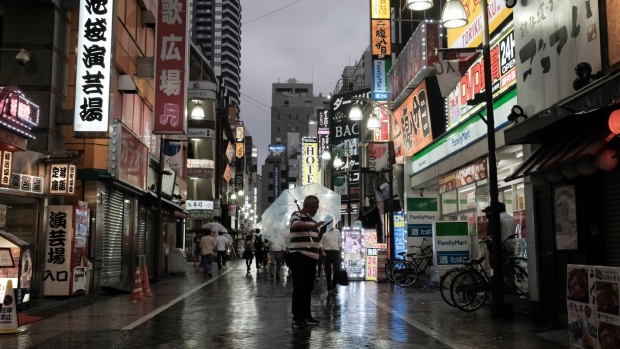Sep 8, 2021
Japan Government Plans to Extend Virus Emergency to Sept. 30
, Bloomberg News

(Bloomberg) -- The Japanese government plans to extend the virus emergency for Tokyo and large parts of the country by more than two weeks beyond the current Sunday expiration as high levels of delta variant-infections continue to put strain on the medical system.
The government has told the ruling coalition it’s planning to extend the state of emergency in Tokyo, Osaka and 17 other prefectures until Sept. 30, public broadcaster NHK reported Wednesday night without attribution.
There are also plans to gradually normalize the economy with the use of vaccine certificates even in areas under state of emergencies, NHK said in a separate report. Restrictions on restaurants and bars would be eased if they are certified, while fully vaccinated people won’t be discouraged from domestic travel, it said.
Economy Minister Yasutoshi Nishimura, the government’s czar for coronavirus policy, was expected to formally make the recommendation Thursday morning. Prime Minister Yoshihide Suga typically consults with experts and makes the recommendation official soon after that.
The move comes less than a week after Suga announced his resignation following a drop in public support as he struggled to contain the surge in cases to record levels. His replacement faces the tricky task of balancing efforts to rein in the virus against the need to support the economy and chart a way forward for normalizing activity.
Japan’s Suga Quits as Premier, Throwing Open Succession Race
Across Japan, 21 prefectures and areas are currently under a state of emergency and the measures cover more than 70% of the population.
The states of emergency, which have few legal teeth, have become less effective in changing people’s behavior over time. Many bars and restaurants are ignoring instructions to close early and stop serving alcohol, despite the threat of fines.
Cases in Tokyo have fallen from a peak of 5,773 on August 13 to 1,834 on Wednesday. While the numbers have dropped from records, they are still at some of their highest levels during the entirety of the pandemic.
Japan was slow out of the gate with its vaccination program but the country has been picking up speed, with 48% of its population now fully vaccinated. This compares to 53.8% in the U.S., which started its program several months earlier.
©2021 Bloomberg L.P.






